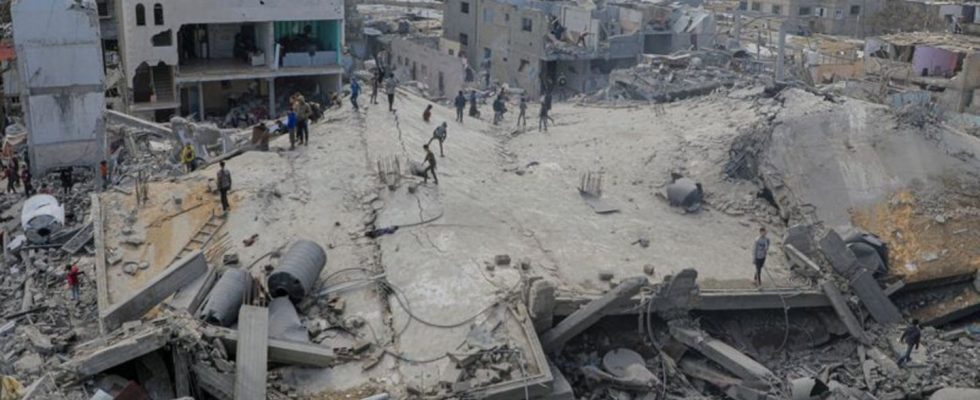The USA, Qatar and Egypt have been mediating between Israel and Hamas for weeks. The goal is a ceasefire. Washington is confident that things are now moving forward. The overview.
According to the USA, the tough indirect negotiations over a temporary ceasefire and the release of hostages in the Gaza war are making progress.
We are getting “closer and closer” to a deal, said US Secretary of State Antony Blinken in an interview with a Saudi Arabian TV station during his visit to the Saudi Arabian port city of Jeddah on Wednesday. The differences between the negotiating partners would become smaller. “I think an agreement is very possible,” Blinken said. He then wanted to travel to Egypt and on Friday to Israel.
The USA, Qatar and Egypt have been mediating between Israel and the Islamist Hamas for weeks. The aim is a ceasefire and the exchange of hostages for Palestinian prisoners. There is a “very strong proposal” on the table, said Blinken. Now we have to see whether Hamas agrees.
Israel should consider alternatives to Rafah offensive
US Defense Secretary Lloyd Austin, meanwhile, called on his Israeli counterpart Joav Galant to consider alternatives to a ground offensive in the refugee-filled city of Rafah in the southern Gaza Strip.
In a phone call with Galant on Wednesday, Austin highlighted the need to consider options other than a major ground operation in Rafah, the Department of Defense in Washington said. According to the information, the conversation also discussed the urgent need to do more to protect the civilian population and to expand the transport of relief supplies to the sealed-off Gaza Strip by land.
Netanyahu: It will take some time until the Rafah offensive
Galant is expected in Washington next week. The Pentagon said the talks would then continue. An Israeli delegation is also scheduled to travel to the US capital to speak to US government representatives about their concerns about the planned ground offensive in Rafah.
Israeli Prime Minister Benjamin Netanyahu made it clear on Wednesday that preparations for such an offensive would still take some time. But he wants to hold on to it. Netanyahu reiterated that he had already approved the army’s operational plan for Rafah, “and soon we will also approve the plan to evacuate civilians from the combat areas.”
Israel is under international pressure to refrain from a ground offensive in Rafah. The USA also wants to dissuade its ally from doing so. Washington’s tone towards Netanyahu and his government has sharpened significantly in view of the catastrophic humanitarian situation in Gaza and the many civilian casualties in recent weeks. At the same time, however, the USA sees itself as Israel’s protective power and continues to support the country with billions in military aid. A US State Department spokesman reiterated on Wednesday that there had been no change in Washington’s support for Israel.
USA wants to continue supporting Israel
The ministry spokesman was asked for a reaction to Canada’s announcement that it would not approve any new arms exports to Israel for the time being. This was a sovereign decision by the Canadians, he replied. US President Joe Biden made it clear that the US continues to support Israel and its right to self-defense – and at the same time Israel must protect the lives of civilians.
US Secretary of State Blinken’s renewed talks in the Middle East are also about a vision for lasting peace in the region. “We want the conflict to end as quickly as possible, while preserving Israel’s ability to defend itself,” Blinken said in the interview on Saudi television.
Blinken is also concerned with the future of Gaza
Blinken reiterated the US desire for the Palestinian Authority, which governs the West Bank and is led by Palestinian President Mahmoud Abbas, to be transformed and then take back control of the Gaza Strip. Washington also wants to promote a two-state solution as a comprehensive approach to pacifying the Middle East.
Such a solution means an independent Palestinian state that exists peacefully side by side with Israel. However, Netanyahu rejects this, as does Hamas. The Palestinian Authority forcibly expelled them from Gaza in 2007 and denies Israel the right to exist.
Report: Israel must prevent anarchy in Gaza
Many former Israeli security officials agree that Netanyahu lacks a workable plan for managing the densely populated coastal area, making it impossible to find a path to a more stable future, the New York Times wrote on Wednesday.
Some are convinced that Netanyahu must now set up an administration in northern Gaza and other areas from which the army has also withdrawn. Chaos and anarchy must be prevented from spreading any further. Hamas must also be prevented from repositioning itself. Without a plan, Israel’s soldiers would be embroiled in a protracted war of attrition, the newspaper wrote.
Israel’s military launches another airstrike in the West Bank
Meanwhile, the Israeli Air Force said it carried out another anti-terror operation in the occupied West Bank on Wednesday. A warplane attacked two gunmen in the Nur Shams refugee camp in Tulkarem “who posed an immediate threat to the troops,” the Israeli army said late in the evening. The information could not initially be independently verified, and there were initially no further details.
It was the second Israeli airstrike in the West Bank of the day. The air force had previously targeted a Palestinian vehicle in the city of Jenin. It was said that the attack targeted two high-ranking members of the terrorist organization Islamic Jihad. According to the Palestinian Ministry of Health in Ramallah, three people were killed.

